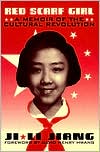 When China’s Communist Party detained Ji-li’s father, the 12-year-old was faced with the most difficult choice of her life. She could denounce her father and break with her family, or she could refuse to testify and sacrifice her future in her beloved Communist Party.
When China’s Communist Party detained Ji-li’s father, the 12-year-old was faced with the most difficult choice of her life. She could denounce her father and break with her family, or she could refuse to testify and sacrifice her future in her beloved Communist Party.
Related: Biography - Autobiography- Memoir, China, Intermediate (ages 9-14)
array(7) {
["Author"]=>
array(1) {
[0]=>
string(12) "Jiang, Ji-li"
}
["_edit_lock"]=>
array(1) {
[0]=>
string(10) "1257145698"
}
["_edit_last"]=>
array(1) {
[0]=>
string(1) "2"
}
["isbn"]=>
array(1) {
[0]=>
string(13) "9780060275853"
}
["pagecount"]=>
array(1) {
[0]=>
string(3) "304"
}
["pubdate"]=>
array(1) {
[0]=>
string(4) "1997"
}
["publisher"]=>
array(1) {
[0]=>
string(13) "HarperCollins"
}
}


This book tells quite vividly the effects of how power can force people to do things that they do not wish to do. In this novel, the main character, Ji-li, comes from a family that was prosperous in the past. The way in which they earned this prosperity was through Ji-li’s grandfather, who was a landowner. Because of Mao’s Cultural Revolution, however, anybody who has a family that is linked with an ‘oppressive background’ must become reeducated. Ji-li is forced to constantly choose between her family’s traditional ways and her government’s new ways. I think that this book would be very useful in a classroom setting in order to discuss how privileged classes can oppress other parallel groups. It can also be used to show that parallel groups do exist in countries that are traditionally considered homogeneous.
Red Scarf Girl is another significant book that invites readers to the world of confusion that sociocultural values and belief are shaken through political paradigm shifts. Ji-Li was a good student at school. Striving for great academic achievement and maintaining her good student status have been her focus at school. However, the Chinese Cultural Revolution changes everything. Respecting teachers and peers are no longer socially recognized cultural ethos. Instead, teachers and peers became the public target whom students are encouraged to report accusingly. At home, traditionally important and precious cultural items in Chinese culture are no longer valued but “evil”. Ji-Li has to teach herself to deconstruct traditionally embedded cultural values and ethos in such shocking and life-threatening fear.
Red Scarf Girl richly portrays how a 12-year-old girl would feel such tension. Not being able to trust friends and neighbors or parents seems to be most fearful experiences according to Ji-Li. Her voice powerfully reflect how young people can be the first victim of political paradigm shifts in which propaganda becomes such psudo ‘truth’.
Red Scarf Girl richly portrays how 12-year-old girl would feel like such tension. Not being able to trust friends and neighbors or parents seems to be most fearful experiences according to Ji-Li. Ji-Li’s voice powerfully reflect how young people become the first victim of political paradigm shifts in which propaganda becomes such psudo ‘truth’.